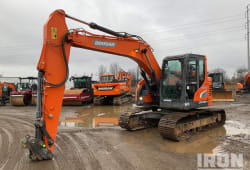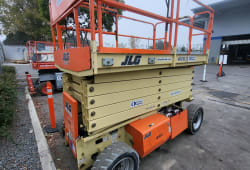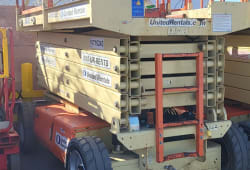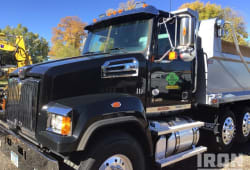10 Tips for Maintaining Your Tri Axle Truck
8 Lectura mínima
)
junio 11, 2023
Your tri-axle truck is a powerful machine, but it needs regular maintenance to keep it running smoothly and safely. They're perfect for construction sites and other places where large amounts of material need to be moved.
To keep your tri-axle dump truck operating safely and effectively, maintenance is essential. This includes routine brake checks, tire rotations, and oil changes. By following a regular maintenance schedule, you can help to extend the life of your truck and prevent costly repairs
Best Tips for Maintaining Tri Axle Truck
Here are 10 tips to help you keep your tri-axle truck running safely and efficiently:
1. Change the oil and filter regularly.
Old oil can make your engine cranky, so be sure to give it a fresh change every 3,000 miles or 3 months, whichever comes first. This will help to keep your engine running smoothly and prevent costly repairs down the road. Here are some of the benefits of changing your oil regularly:
Reduced friction: Fresh oil helps to reduce friction between moving parts, which can help to prevent wear and tear.
Improved heat dissipation: Fresh oil helps to dissipate heat from moving parts, which can help to prevent overheating.
Extended lifespan: Regular oil changes can help to extend the lifespan of your engine.
2. Check the tire pressure regularly.
Underinflated tires can cause your truck to overheat and increase the risk of a blowout. So be sure to give your tires a regular checkup every week and make sure they're at the right pressure. This will help to keep your truck running safely and prevent costly tire repairs. Here are some of the benefits of checking your tire pressure regularly:
Reduced wear and tear: Proper tire pressure helps to reduce wear and tear on your tires, which can help to extend their lifespan.
Improved fuel efficiency: Proper tire pressure can help to improve your fuel efficiency, which can save you money at the pump.
Increased safety: Proper tire pressure can help to improve your handling and braking, which can help to prevent accidents.
3. Inspect the brakes regularly.
Worn brakes can make your truck stop like a snail, and increase the risk of an accident. So be sure to give your brakes a monthly checkup and make sure they're in good condition. This will help to keep your truck running safely and prevent costly brake repairs. Here are some of the things to look for when inspecting your brakes:
Brake pads: The brake pads should be thick and have a good amount of material left on them. If the brake pads are thin or worn down, they need to be replaced.
Rotors: The rotors should be smooth and free of any grooves or rust. If the rotors are warped or damaged, they need to be resurfaced or replaced.
Fluid levels: The brake fluid level should be full. If the brake fluid level is low, it needs to be topped off.
4. Lubricate the moving parts regularly.
Lubrication is important for keeping your truck's moving parts running smoothly and preventing wear and tear. Grease the moving parts every 3,000 miles or 3 months, whichever comes first. Here are some of the benefits of lubricating your truck's moving parts regularly:
Reduced friction: Lubrication reduces friction between moving parts, which helps to prevent wear and tear.
Improved heat dissipation: Lubrication helps to dissipate heat from moving parts, which helps to prevent overheating.
Increased lifespan: Lubrication helps to extend the lifespan of moving parts.
5. Check the fluid levels regularly.
Checking the fluid levels regularly is important for preventing engine damage and keeping your truck running smoothly. Check the oil level every week, the coolant level every month, and the brake fluid level every year. Here are some of the fluids that you need to check regularly:
Oil: Oil lubricates the engine and helps to prevent wear and tear.
Coolant: Coolant helps to keep the engine cool and prevents overheating.
Brake fluid: Brake fluid helps to stop the truck and prevent accidents.
6. Have the truck serviced by a qualified mechanic regularly.
Having your truck serviced by a qualified mechanic regularly is important for catching any potential problems before they cause major damage. Have the truck serviced every year, or sooner if needed. Here are some of the things that a mechanic will do when servicing your truck:
Check the engine: The mechanic will check the oil level, coolant level, and brake fluid level. They will also check the belts and hoses for wear and tear.
Check the brakes: The mechanic will check the brake pads and rotors for wear and tear. They will also bleed the brake lines to remove any air bubbles.
Check the tires: The mechanic will check the tire pressure and tread depth. They will also rotate the tires to evenly distribute wear.
Check the suspension: The mechanic will check the shock absorbers and struts for wear and tear. They will also align the wheels to ensure that the truck is driving straight.
7. Store the truck in a cool, dry place when not in use.
Storing your truck in a cool, dry place when not in use is important for preventing corrosion and extending the life of the truck. Avoid storing the truck in direct sunlight, as this can cause the paint to fade and the interior to heat up. If you must store the truck in a hot climate, be sure to park it in the shade and cover it with a tarp. Here are some of the benefits of storing your truck in a cool, dry place:
Reduced corrosion: Storing your truck in a cool, dry place helps to reduce corrosion, which can damage the metal parts of the truck.
Extended lifespan: Storing your truck in a cool, dry place helps to extend the lifespan of the truck.
8. Do not overload the truck.
Overloading your truck can cause the engine to overheat, the brakes to fail, and the tires to blow out. Be sure to check the weight capacity of your truck and do not exceed it. If you are unsure of the weight capacity of your truck, consult the owner's manual. Here are some of the risks of overloading your truck:
Engine overheating: Overloading your truck can cause the engine to overheat, which can damage the engine and cause it to fail.
Brake failure: Overloading your truck can cause the brakes to fail, which can lead to an accident.
Tire blowout: Overloading your truck can cause the tires to blow out, which can lead to an accident.
9. Drive the truck carefully.
Driving your truck carefully is important for preventing accidents and keeping yourself and others safe. Be sure to obey all traffic laws and drive defensively. Avoid driving too fast or too close to other vehicles. Be sure to check your mirrors often and be aware of your surroundings. Here are some tips for driving your truck safely:
Obey all traffic laws: Obeying all traffic laws, including speed limits and stop signs, is important for preventing accidents.
Drive defensively: Driving defensively means being aware of your surroundings and being prepared for the unexpected.
Avoid driving too fast or too close to other vehicles: Driving too fast or too close to other vehicles can increase the risk of an accident.
Check your mirrors often: Checking your mirrors often will help you to be aware of your surroundings and avoid accidents.
Be aware of your surroundings: Being aware of your surroundings will help you to avoid accidents.
10. Follow the manufacturer's instructions.
The manufacturer's instructions are there for a reason. They are written by experts who know how to operate and maintain your truck safely and effectively. By following the instructions, you can help to ensure that your truck will last for many years to come. Here are some of the benefits of following the manufacturer's instructions: · Safe operation: The manufacturer's instructions will help you to operate your truck safely. This includes things like how to use the controls, how to load and unload the truck, and how to drive in different conditions.
Longer lifespan: By following the manufacturer's instructions, you can help to extend the lifespan of your truck. This is because the instructions will tell you how to maintain your truck properly, which can prevent wear and tear.
Reduced costs: Following the manufacturer's instructions can help you to reduce the cost of owning and operating your truck. This is because the instructions will help you to avoid costly repairs and breakdowns.
Conclusion
In conclusion, maintaining your tri-axle dump truck is crucial for its safe and efficient operation. Regular oil changes, tire pressure checks, brake inspections, and lubrication are key. Checking fluid levels, servicing the truck by a qualified mechanic, and storing it properly also play a significant role in extending its lifespan.
Avoid overloading the truck, drive carefully, and follow the manufacturer's instructions for optimal performance. By implementing these tips, you can ensure the truck's longevity, reduce costs, and promote safe driving practices.

Rex Walz is Boom & Bucket's Manager of Supplier Relations, bringing over a decade of experience in B2B sales and heavy equipment solutions. With a background spanning government, construction, industrial, and commercial sectors, he has a proven track record of driving growth and building trusted customer relationships. At Boom & Bucket, Rex is passionate about helping partners succeed while advancing the company's mission to create the most trusted marketplace for heavy equipment.














